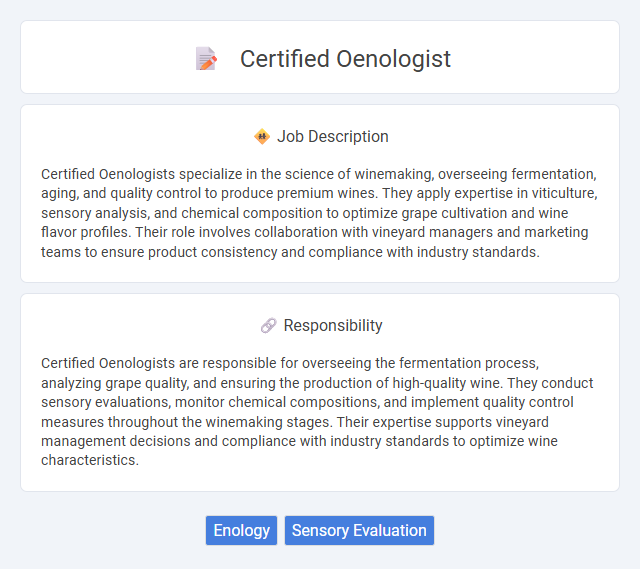
Certified Oenologists specialize in the science of winemaking, overseeing fermentation, aging, and quality control to produce premium wines. They apply expertise in viticulture, sensory analysis, and chemical composition to optimize grape cultivation and wine flavor profiles. Their role involves collaboration with vineyard managers and marketing teams to ensure product consistency and compliance with industry standards.
Individuals with a strong passion for wine, excellent sensory analysis skills, and attention to detail may have a high probability of thriving as Certified Oenologists. People who are comfortable working in lab environments, enjoy scientific research, and possess patience for long-term aging processes might find this job especially suitable. Those who may struggle with repetitive tasks, limited physical activity, or irregular hours could be less compatible with the demands of oenology.
Qualification
A Certified Oenologist typically holds a degree in viticulture, enology, or a related field, complemented by specialized certifications from recognized wine industry institutions. Extensive knowledge in wine chemistry, fermentation processes, and sensory evaluation is essential to qualify for this role. Hands-on experience in vineyards and wineries, alongside proficiency in quality control and wine production techniques, is critical for professional certification.
Responsibility
Certified Oenologists are responsible for overseeing the fermentation process, analyzing grape quality, and ensuring the production of high-quality wine. They conduct sensory evaluations, monitor chemical compositions, and implement quality control measures throughout the winemaking stages. Their expertise supports vineyard management decisions and compliance with industry standards to optimize wine characteristics.
Benefit
Certified Oenologists likely offer significant benefits through their expert knowledge of wine production, potentially improving the quality and consistency of wine products. They probably enhance vineyard management and fermentation processes, resulting in better yield and flavor profiles. Their expertise may also increase marketability and consumer satisfaction, contributing to the overall success of wineries.
Challenge
The role of a Certified Oenologist likely involves the complex challenge of mastering both the scientific and artistic aspects of winemaking, balancing chemical precision with sensory evaluation. Navigating variable factors such as grape quality, fermentation processes, and aging conditions may pose significant difficulties requiring continuous adaptation and innovation. This demanding position probably requires strong problem-solving skills to consistently produce high-quality wines that meet industry standards.
Career Advancement
Certified Oenologists play an essential role in the wine industry by applying advanced expertise in grape cultivation, fermentation processes, and wine quality analysis. Career advancement opportunities include positions such as senior wine production manager, vineyard director, or research scientist in enology, often leading to roles in executive management or consultancy. Mastery in sensory evaluation and wine chemistry significantly enhances prospects for leadership roles within wineries or global wine corporations.
Key Terms
Enology
Certified Oenologists specialize in the scientific study and management of wine production, with expertise in grape fermentation, aging processes, and flavor profiling. They utilize advanced enological techniques to enhance wine quality, monitor microbial activity, and ensure compliance with industry standards. Their skills are essential in vineyard management, laboratory analysis, and wine blending to produce premium wines with consistent taste and aroma.
Sensory Evaluation
Certified Oenologists specialize in sensory evaluation, using expert palate training to assess wine aroma, flavor, body, and balance, ensuring product consistency and quality. They apply advanced techniques to detect subtle characteristics and potential faults, guiding vineyard and cellar practices. Their sensory analysis directly influences blending decisions and helps maintain brand standards in diverse markets.
 kuljobs.com
kuljobs.com